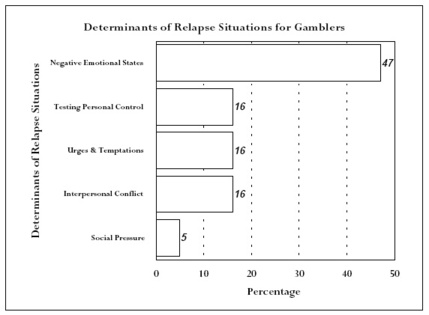The WAGER, Vol. 2(22) – Relapse among problem gamblers
Little research has been done exploring patterns of relapse among problem gamblers. In 1980, Cummings, Gordon, & Marlatt* surveyed 19 male gamblers from Gamblers Anonymous in eight major U.S. cities about their reasons for relapse. For this study, relapse was defined as any gambling after a period of abstinence. For 47% of the gamblers, the reason for relapse was negative emotional states. A negative emotional state (e.g., boredom, frustration, anger) was defined as an adverse emotional reaction either to environmental situations (e.g., accidents or hard life events) or interpersonal situations that occurred previously (e.g., arguments). Other reasons for relapse included testing personal control (16%), urges and temptations (16%), interpersonal conflict (16%), and social pressure (5%). These data are limited by the small number of gamblers in the study. Brown** points out that while relapse may be triggered by an external event, relapses are often reversions to former patterns of behavior that are purposeful and functional. For example, many gamblers may experience “a long-running and recurring entertainment of possibilities of relapse or full-scale running fantasies which can be accepted, taken up, and put into operation in a purposive way at any time”3. One of the functional aspects of these reversions, when carried out, is that they give the gambler practice in weighing costs and benefits of their problem gambling behavior. These patterns of relapse have been well established in the substance abuse field. Continued research into relapses among problem gamblers will enable treatment providers and programs to offer problem gamblers more effective strategies for reducing adverse consequences of their gambling behavior.
Sources: *Cummings, C., Gordon, J.R., & Marlatt, A. (1980). Relapse prevention and prediction. In: W.R. Miller (Ed.), The addictive behaviors. New York: Pergamon, pp. 291-321; **Brown, R.I.F. (1989). Relapses from a gambling perspective. In: M. Gossop, (Ed.), Relapse and addictive behaviour. New York: Routledge, pp. 107-132; 3Brown, R.I.F. (1989), p. 124.
This public education project is funded, in part, by The Andrews Foundation.
